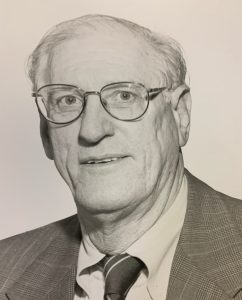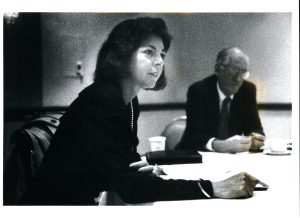A Major Influencer of his Time, the Founding Father of Michigan’s Children had a Vision to Change Public Policy for Kids in Michigan

(Feb. 14, 2024) Cynthia Wilbanks said she was intrigued when she first learned of efforts to establish a new, first-of-its-kind, nonpartisan child advocacy organization for Michigan. The year was 1992 and the effort was led by The Skillman Foundation’s president, attorney Leonard W. Smith. At the start of what became Voices for Michigan’s Children, later renamed Michigan’s Children, was a commitment to launch a broad-based organization that could impact public policy at the legislative and administrative levels of government, she recalled. But its exclusive focus would be on issues that impact children. From the beginning, the organizational structure that Smith envisioned was a departure from those of other child-focused organizations at the time.
Smith, of Grosse Pointe, died at age 89 last month. In the days following his passing, Wilbanks and other early and current leaders at Michigan’s Children recalled Smith’s influence on the founding of Michigan’s Children.
No where in Michigan was Smith’s multi-issue, child-focused approach being done, Wilbanks said. The storied Michigan League for Human Services (renamed the Michigan League for Public Policy) largely focused on poverty-fighting public policy issues related to adults as well as children. Other child-based organizations pushing for reforms grew out of single issues – disability rights, education, for example. As for foundations and philanthropy-based organizations like Skillman, Kellogg, and Mott at the time, they were involved in significant ways in grant-making, but not bent on changing public policy. That would need to happen elsewhere.
“Leonard was masterful, I would say, in persuading other foundations to consider joining efforts to establish Michigan’s Children,” said Wilbanks, who went on to become its first president and CEO. “It literally meant providing substantial funding to get started, and to provide them with the resources for the first five years. Five years – that was unheard of then.” Besides Skillman, Mott and Kellogg, Smith also persuaded the Fry Foundation and Blue Cross and Blue Shield to financially support launching the newbie. Wilbanks, a former Congressional staffer with political cred and a plethora of connections in the state, also wanted in. In December 1992, she readily accepted an offer from a search committee led by Smith to become its first president.
“He kept a very watchful eye on Michigan’s Children. It was his baby,” Wilbanks said this week.
As a leader, Smith was purposeful, determined, and optimistic, colleagues said. He was deeply committed to collecting as much information as possible to make good decisions. That, and a characteristic twinkle in his eye, made him a man others found it hard to say no to.
A turning point in Smith’s life came when he acquired a new client, Rose Skillman, the widow of Robert Skillman of Bloomfield Hills, an early pioneer and wealthy executive of the corporation that became 3M. Rose Skillman was committed to charitable causes associated with the well-being of vulnerable children. With Smith’s help, she established an endowment and grant-making foundation focused on children in 1960 with funds from 3M stock shares she owned. With no direct heirs, her foundation’s assets totaled $100 million at the time of her death in 1983.
“You have to appreciate people who can see, have a vision of a future that is dedicated frankly to improving lives. And that’s what he was about,” Wilbanks said.
John Ziraldo was a young program officer and mentee of Smith’s at Skillman, and he was there when the foundation decided to “incubate” Michigan’s Children out of their offices for a few years. Today, Ziraldo is one of Michigan’s Children’s senior board members.
“Leonard was quietly one of the most influential people I’ve had the pleasure to work with,” Ziraldo said. “He sensed a real need in the state, and put (several) foundations’ resources and people behind it. That’s why Michigan’s Children has not just continued, but thrived. Michigan’s Children’s history hasn’t always been easy. But part of its success has been the right initial vision. It wasn’t seen as just there, doing the foundations’ bidding.”
Another characteristic Ziraldo identified was Smith’s notion of success. “He recognized that if Michigan’s Children was seen as his pet project and only possible because of his charisma or personality, then if he was no longer there, it would flounder.”
When it came to making progress on any issue, Ziraldo said Smith was patient, willing to take the long view. “No one was going to outwork him or be more persistent than he was. He had this sort of humble way of doing big things. He is what I call an incrementalist, one piece at a time over a long period of time. That’s how to make change and sustain it over time. That had for me personally a profound influence.”
Smith was a mentor to a whole generation of philanthropists, Ziraldo said. He was a champion for equity, hiring and nurturing a diverse group of people not just at Skillman but later when he served the Ethel and James Flinn Foundation.
“He believed big things could be done, and dollars, all by themselves, were relatively weak for social change. It required public will.”
Sharon Claytor Peters followed Wilbanks as Michigan’s Children’s president and CEO, serving from 1996 to 2008. She described Smith as the spark that set Michigan’s Children in motion on a national stage as part of Voices for America’s Children, a network of state members whose singular focus was the well-being of children. Along with that connection, Smith thought it was vital for Michigan’s Children to become connected with the now iconic Kids Count project, affiliated with the respected Annie E. Casey Foundation. “He thought it could be very potent for Michigan’s Children to join, and I did too,” she said of Voices for America’s Children. To oversee Kids Count, he agreed to bring in a young child policy analyst, Pat Sorenson, who later emerged to become one of Michigan’s celebrated policy analysts and child advocates. She retired from the Michigan League for Public Policy in 2021. Claytor Peters said Smith adamantly believed that Michigan’s Children should be politically neutral; today it remains bipartisan, working with Republicans and Democrats, and refuses to endorse office-seekers.
“He was the central figure in launching this organization. I don’t believe there would be a Michigan’s Children had Leonard Smith not become interested in creating one,” she said.
 Pictured: Cynthia Wilbanks (in the foreground) with Smith, then president of the Skillman Foundation, at the press announcement of her naming as the first president of Michigan’s Children (circa December,1992).
Pictured: Cynthia Wilbanks (in the foreground) with Smith, then president of the Skillman Foundation, at the press announcement of her naming as the first president of Michigan’s Children (circa December,1992).
 Teri Banas is director of programs and communications at Michigan’s Children. Reach her at teri@michiganschildren.org.
Teri Banas is director of programs and communications at Michigan’s Children. Reach her at teri@michiganschildren.org.
